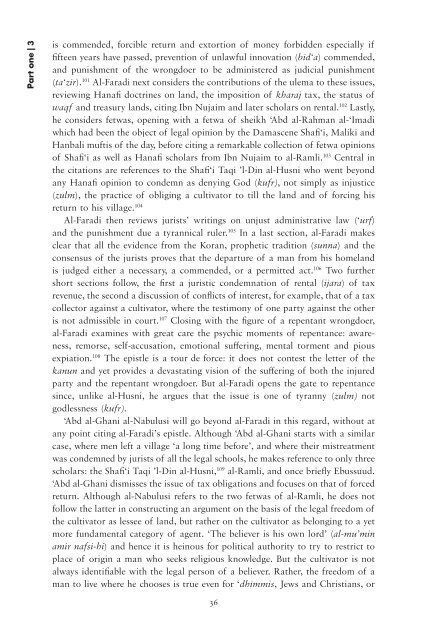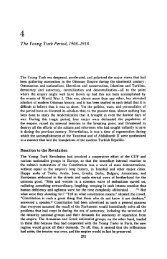Governing property, making the modern state - PSI424
Governing property, making the modern state - PSI424
Governing property, making the modern state - PSI424
You also want an ePaper? Increase the reach of your titles
YUMPU automatically turns print PDFs into web optimized ePapers that Google loves.
Part one | 3<br />
is commended, forcible return and extortion of money forbidden especially if<br />
fifteen years have passed, prevention of unlawful innovation (bid‘a) commended,<br />
and punishment of <strong>the</strong> wrongdoer to be administered as judicial punishment<br />
(ta‘zir). 101 Al-Faradi next considers <strong>the</strong> contributions of <strong>the</strong> ulema to <strong>the</strong>se issues,<br />
reviewing Hanafi doctrines on land, <strong>the</strong> imposition of kharaj tax, <strong>the</strong> status of<br />
waqf and treasury lands, citing Ibn Nujaim and later scholars on rental. 102 Lastly,<br />
he considers fetwas, opening with a fetwa of sheikh ‘Abd al-Rahman al-‘Imadi<br />
which had been <strong>the</strong> object of legal opinion by <strong>the</strong> Damascene Shafi‘i, Maliki and<br />
Hanbali muftis of <strong>the</strong> day, before citing a remarkable collection of fetwa opinions<br />
of Shafi‘i as well as Hanafi scholars from Ibn Nujaim to al-Ramli. 103 Central in<br />
<strong>the</strong> citations are references to <strong>the</strong> Shafi‘i Taqi ’l-Din al-Husni who went beyond<br />
any Hanafi opinion to condemn as denying God (kufr), not simply as injustice<br />
(zulm), <strong>the</strong> practice of obliging a cultivator to till <strong>the</strong> land and of forcing his<br />
return to his village. 104<br />
Al-Faradi <strong>the</strong>n reviews jurists’ writings on unjust administrative law (‘urf)<br />
and <strong>the</strong> punishment due a tyrannical ruler. 105 In a last section, al-Faradi makes<br />
clear that all <strong>the</strong> evidence from <strong>the</strong> Koran, prophetic tradition (sunna) and <strong>the</strong><br />
consensus of <strong>the</strong> jurists proves that <strong>the</strong> departure of a man from his homeland<br />
is judged ei<strong>the</strong>r a necessary, a commended, or a permitted act. 106 Two fur<strong>the</strong>r<br />
short sections follow, <strong>the</strong> first a juristic condemnation of rental (ijara) of tax<br />
revenue, <strong>the</strong> second a discussion of conflicts of interest, for example, that of a tax<br />
collector against a cultivator, where <strong>the</strong> testimony of one party against <strong>the</strong> o<strong>the</strong>r<br />
is not admissible in court. 107 Closing with <strong>the</strong> figure of a repentant wrongdoer,<br />
al-Faradi examines with great care <strong>the</strong> psychic moments of repentance: awareness,<br />
remorse, self-accusation, emotional suffering, mental torment and pious<br />
expiation. 108 The epistle is a tour de force: it does not contest <strong>the</strong> letter of <strong>the</strong><br />
kanun and yet provides a devastating vision of <strong>the</strong> suffering of both <strong>the</strong> injured<br />
party and <strong>the</strong> repentant wrongdoer. But al-Faradi opens <strong>the</strong> gate to repentance<br />
since, unlike al-Husni, he argues that <strong>the</strong> issue is one of tyranny (zulm) not<br />
godlessness (kufr).<br />
‘Abd al-Ghani al-Nabulusi will go beyond al-Faradi in this regard, without at<br />
any point citing al-Faradi’s epistle. Although ‘Abd al-Ghani starts with a similar<br />
case, where men left a village ‘a long time before’, and where <strong>the</strong>ir mistreatment<br />
was condemned by jurists of all <strong>the</strong> legal schools, he makes reference to only three<br />
scholars: <strong>the</strong> Shafi‘i Taqi ’l-Din al-Husni, 109 al-Ramli, and once briefly Ebussuud.<br />
‘Abd al-Ghani dismisses <strong>the</strong> issue of tax obligations and focuses on that of forced<br />
return. Although al-Nabulusi refers to <strong>the</strong> two fetwas of al-Ramli, he does not<br />
follow <strong>the</strong> latter in constructing an argument on <strong>the</strong> basis of <strong>the</strong> legal freedom of<br />
<strong>the</strong> cultivator as lessee of land, but ra<strong>the</strong>r on <strong>the</strong> cultivator as belonging to a yet<br />
more fundamental category of agent. ‘The believer is his own lord’ (al-mu’min<br />
amir nafsi-hi) and hence it is heinous for political authority to try to restrict to<br />
place of origin a man who seeks religious knowledge. But <strong>the</strong> cultivator is not<br />
always identifiable with <strong>the</strong> legal person of a believer. Ra<strong>the</strong>r, <strong>the</strong> freedom of a<br />
man to live where he chooses is true even for ‘dhimmis, Jews and Christians, or<br />
36












